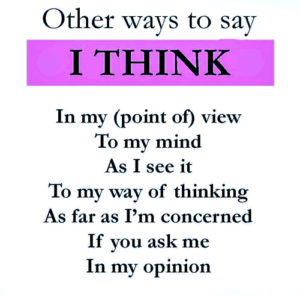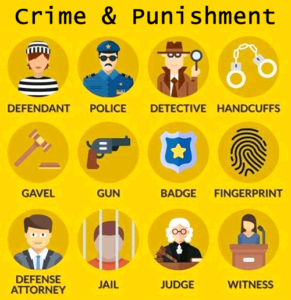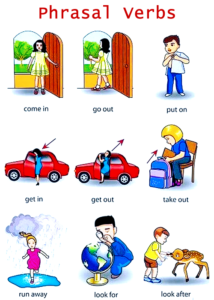Can you think of any more? If you have any questions or doubts, please ask in the comments or send me a private message. Follow me on Instagram: @englishyourwaybr or look for the hashtag #LearnEnglishWithCarlo
Category: QUICK TIP
Permanent link to this article: https://englishyourway.com.br/other-ways-to-say-i-think/
Feb 12
OTHER WAYS TO SAY … Bad
Permanent link to this article: https://englishyourway.com.br/other-ways-to-say-bad/
Feb 12
VOCABULARY – Crime & Punishment
The criminal justice system keep us safe from criminals. When a person arrested by a policeman with a badge and is accused of a crime that person becomes a defendant. Police usually carry guns. A detective usually investigates the crime. Police and detectives usually put handcuffs on the defentant to make sure he cant escape. Later …
Permanent link to this article: https://englishyourway.com.br/vocabulary-crime-punishment/
Feb 12
PHRASAL VERBS – mixed
A phrasal verb is a combination of a verb and an adverb or preposition, for example ‘look up’ or ‘look after’, which together have a particular meaning which is different from the verb alone. The following phrasal verbs are featured in this slide. come in go out put on get in get out take out run away look for …
Permanent link to this article: https://englishyourway.com.br/phrasal-verbs-mixed/
Feb 12
VOCABULARY – Instead of VERY (7)
The word VERY is an adverb and an intensifier – it comes before an adverb or adjective to make it more intense (to a higher degree). Say frail instead of very weak. Say keen instead of very eager. Say meticulous instead of very detailed. Say perplexed instead of very confused. Say bustling instead of very crowded. Say basic instead of very …
Permanent link to this article: https://englishyourway.com.br/vocabulary-instead-of-very-7/
Feb 12
VOCABULARY – Instead of VERY (6)
The word VERY is an adverb and an intensifier – it comes before an adverb or adjective to make it more intense (to a higher degree). Say sage instead of very wise. Say pouring instead of very rainy. Say cutthroat instead of very competetive. Say stingy instead of very cheap. Say perplexed instead of very confused. Say exhiliarating instead of very …
Permanent link to this article: https://englishyourway.com.br/vocabulary-instead-of-very-6/
Feb 12
VOCABULARY – Instead of VERY (5)
The word VERY is an adverb and an intensifier – it comes before an adverb or adjective to make it more intense (to a higher degree). Say immaculate instead of very neat. Say perilous instead of very risky. Say fearful instead of very afraid. Say innovative instead of very creative. Say wicked instead of very evil. Say excellent instead of …
Permanent link to this article: https://englishyourway.com.br/vocabulary-instead-of-very-5/
Feb 12
VOCABULARY – Instead of VERY (4)
The word VERY is an adverb and an intensifier – it comes before an adverb or adjective to make it more intense (to a higher degree). Say indolent instead of very lazy. Say obese instead of very fat. Say terrified instead of very afraid. Say exact instead of very accurate. Say frequently instead of very often. Say pungent instead of very …
Permanent link to this article: https://englishyourway.com.br/vocabulary-instead-of-very-4/
Feb 12
VOCABULARY – Instead of VERY (3)
The word VERY is an adverb and an intensifier – it comes before an adverb or adjective to make it more intense (to a higher degree). Say gaunt instead of very thin. Say hideous instead of very ugly. Say villainous instead of very wicked. Say silent instead of very quiet. Say exact instead of very accurate. Say spotless instead of …
Permanent link to this article: https://englishyourway.com.br/vocabulary-instead-of-very-3/
Feb 12
VOCABULARY – Instead of VERY (2)
The word VERY is an adverb and an intensifier – it comes before an adverb or adjective to make it more intense (to a higher degree). Say perelous instead of very risky. Say brief instead of very short. Say distressed instead of very worried. Say distraught instead of very upset. Say overjoyed instead of very glad. Say adorable instead of very …
Permanent link to this article: https://englishyourway.com.br/vocabulary-instead-of-very-2/



